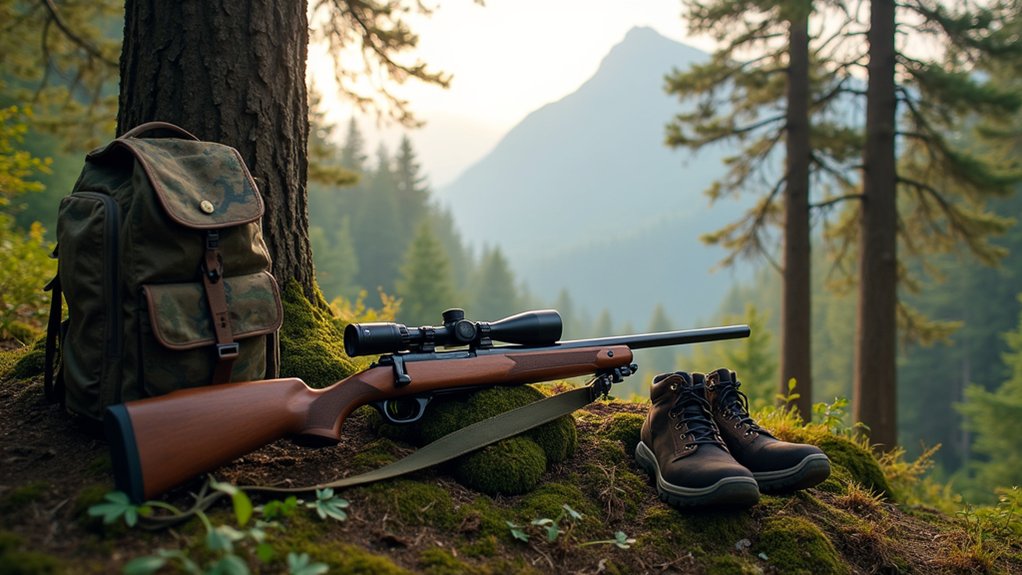Hunting with rifles can be a rewarding adventure, but it’s essential to start with the right knowledge and mindset. You’ll need to understand rifle types, ammunition choices, and fundamental safety practices. Equipping yourself with the basics not only enhances your experience but also guarantees you’re prepared for the challenges ahead. So, what are the key elements you need to master before heading out into the field? Let’s explore these important aspects together.
Hunting with rifles: What beginners need to know
When you’re new to hunting with rifles, understanding the basics is crucial for a successful experience. Start by familiarizing yourself with safety rules—always treat your rifle as if it’s loaded, and never point it at anything you don’t intend to shoot. Learn how to properly handle and store your rifle, too.
Next, practice your shooting skills at the range, focusing on breath control and trigger discipline. Understand the importance of patience and observation in the field, as these are key to spotting game.
Finally, know the local regulations and hunting seasons to guarantee a legal and ethical hunt.
What types of rifles are best for hunting?
Choosing the right rifle is essential for a successful hunting experience.
For beginners, bolt-action rifles are a great option due to their accuracy and reliability. If you prefer a faster follow-up shot, consider a lever-action rifle. Semi-automatic rifles also provide quick shooting but require more familiarity.
When hunting larger game, a rifle chambered for a larger caliber, like .30-06 or .300 Win Mag, is ideal. For smaller game, a .22 caliber offers a quieter, less intimidating choice.
Evaluate your hunting environment and target species to determine which rifle type aligns best with your needs and comfort level.
How to choose the right ammunition for your rifle
Selecting the right ammunition for your rifle directly impacts your hunting success. First, consider the type of game you’re targeting; heavier bullets are better for larger animals, while lighter ones work for smaller game.
Next, match the caliber of your ammunition to your rifle. Always check for compatibility, as not all bullets fit all rifles.
Pay attention to bullet types, like soft point or hollow point, which affect expansion and penetration.
Finally, test several brands to find one that groups well with your rifle. Proper ammunition choice guarantees accuracy and effectiveness, making your hunting experience more rewarding.
Why is proper rifle maintenance important for hunters?
Although many hunters focus on skills and strategies, proper rifle maintenance is essential for ensuring reliability and performance in the field. A clean and well-maintained rifle functions better, improving your accuracy and shot placement.
Regularly checking for rust, dirt, and wear prevents malfunctions that could ruin a hunt. Additionally, proper lubrication keeps moving parts functioning smoothly, allowing quick follow-up shots if needed.
Neglecting maintenance can lead to misfires or even damage to your firearm, jeopardizing both your safety and success. By prioritizing rifle care, you’re investing in your hunting experience, ensuring you’re always ready when that perfect moment arises.
What safety tips should every beginner rifle hunter follow?
When you head out for your first hunting trip, keeping safety at the forefront of your mind is essential. Always treat your rifle as if it’s loaded, and never point it at anything you don’t intend to shoot.
Wear appropriate eye and ear protection, and make certain you’re aware of your surroundings. Keep your finger off the trigger until you’re ready to fire, and identify your target and what’s beyond it.
Avoid hunting alone; having a buddy can enhance safety. Finally, stay sober—alcohol and hunting don’t mix.
Following these tips will help make certain a safe and enjoyable hunting experience.
How to improve your shooting accuracy while hunting
Improving your shooting accuracy while hunting can greatly enhance your success in the field.
Start by practicing your shooting stance; make certain you’re stable and comfortable. Focus on your breathing—inhale deeply, then exhale slowly as you squeeze the trigger.
Use quality ammunition that matches your rifle and practice regularly to familiarize yourself with its characteristics. Adjust your scope properly and check for zero before heading out.
If possible, mimic hunting conditions during practice to build confidence. Finally, maintain a clear mind; distractions can lead to mistakes.
With dedication and focus, you’ll see a noticeable improvement in your accuracy while hunting.
What are the hunting regulations you need to be aware of?
Shooting accurately while hunting is only part of the equation; understanding hunting regulations is equally important.
Before you head out, check your state’s hunting laws regarding seasons, bag limits, and legal hunting hours. You’ll need to know which species you can hunt and any specific restrictions on weapons or ammunition.
Don’t forget about licensing requirements and whether you need to report your harvest. Familiarize yourself with local wildlife management rules to guarantee you’re hunting ethically and sustainably.
Ignoring these regulations can lead to hefty fines or worse, so stay informed and respect the laws to enjoy a successful hunting experience.
How can you practice effective field scouting before your hunt?
How do you guarantee you’re properly prepared for your hunt? Effective field scouting is essential.
Start by familiarizing yourself with the terrain; hike the area to understand its layout and features. Look for signs of wildlife—tracks, droppings, or feeding areas. Take notes on water sources and potential bedding sites.
Use trail cameras to monitor animal activity and patterns. Pay attention to wind direction, as it affects animal movement.
Finally, scout at different times of the day to see when animals are most active. With thorough scouting, you’ll increase your chances of a successful and enjoyable hunting experience.
